
 |
||||
|---|---|---|---|---|
| Volume 43 Number 33, October 27, 2013 | ARCHIVE | HOME | JBCENTRE | SUBSCRIBE |
Workers' Weekly Internet Edition: Article Index :
Defend the Rights of All! Immigration Bill Passes Second Reading
Workers' Movement:
Royal Mail Postal Workers' Strike
The Fight for a Postal Service that Fulfils the Need of Society and the Social Economy
Privatisation of Royal Mail: Seizing Control of the Value Created by Postal Workers
For Your Information: Who Benefits!The Battle for the Future Direction of the NHS:
Public Meeting Held on Defending Jobs and Services at Whipps Cross Hospital
Changing the Direction on the Funding of the NHS is Central to the Struggle to Safeguard its FutureAnti-War Movement:
Hands Off Syria! British Government and Its Allies Continue to Demand Regime Change in Syria
Weekly On Line Newspaper of the
Revolutionary Communist Party of Britain (Marxist-Leninist)
Website:
http://www.rcpbml.org.uk
E-mail:
office@rcpbml.org.uk
170, Wandsworth Road, London, SW8 2LA.
Phone: 020 7627 0599:
Workers'Weekly Internet Edition
Freely available online
Workers' Weekly E-mail Edition
Subscribe
by e-mail daily: Free / Donate
WW
Internet RSS Feed
![]()
The Line of March Monthly
Publication of RCPB(ML)Subscribe
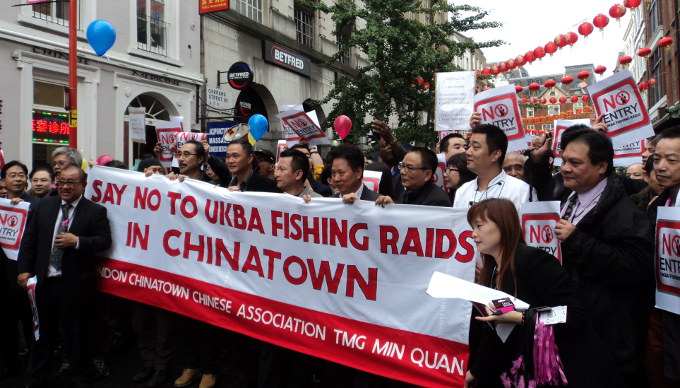
The Immigration Bill, a Government Bill sponsored by Home Secretary
Theresa May, had its second reading debate on October 22 and began its
Committee stage two days later. This Bill erodes the rights of national
minorities through facilitating deportations, restricting the right of appeal
and giving more powers to immigration officers and further entrenches the
position of national minorities as second-class members of society. Like the
equally condemnable Lobbying Bill, it is being rushed through, having been
presented to Parliament just twelve days before its second reading. The
so-called line-by-line scrutiny of the Committee stage has a deadline of
November 19, less than four weeks after beginning its proceedings.
Labour officially backed the Bill when Shadow Home Secretary Yvette Cooper announced that the Party would not oppose, but “amend and reform”, the Bill. The second reading vote was passed by 303 votes to just 18, as Labour abstained.
The Movement Against Xenophobia (MAX) organised a demonstration opposite Parliament on the morning of the second reading. Speaking at the rally, political director of Unite Jenny Formby said that the Bill “isn’t just an issue for migrants. This is an issue for all of us who care about democracy.”
Anti-racist activist Lee Jasper labelled the Bill “divisive” and warned of a return to the shameful period of “no blacks, no dogs, no Irish”. This is in reference to the proposals to deny undocumented migrants access to private housing, via the requirement for landlords to check the legally resident status of tenants. This attempt to restrict the basic right to housing on the basis of nationality and legal status should be denounced.
Similarly, the Bill seeks to deny access to bank accounts and driving licenses. Further, under the fraud of stopping alleged “health tourism”, a proven myth*, the Bill introduces a fee for access to the NHS. This fee, widely speculated at around £200, is to be payable by temporary, legal, migrants originating from outside the European Economic Area.

Stop The Immigration Bill chanting outside
parliament. "Immigrants have the
right here to stay here to fight"In addition, the
Bill significantly removes grounds for appeal to decisions on immigration and
deportation.
Under the banner of “fairness”, the aim is to deny basic human rights and the provision of services to national minorities. It drafts landlords, bank employees, health and other workers into immigration control and the checking of papers, inevitably driving vulnerable sections into desperation, creating the conditions for discrimination, division and further exploitation.
The Bill is a state-organised racist attack and affects the rights of all. By attacking one section to attack all, using the politics of division, it is part of increasing arbitrariness and unaccountability by introducing fees and the checking of status at all levels. It contributes to a general atmosphere of suspicion and other negative emotions intended to bolster an authority out of step with the conditions and wear down any opposition to the agenda of austerity.
The Bill comes in the wake of the broadly condemned anti-immigration vans, telling national minorities to “go home”, which the government was ordered to removed from streets earlier this month due to their breach of advertising standards. It also comes after the previous week’s widely criticised government text messages telling “suspected illegal immigrants” to contact the Home Office.
The anti-human Immigration Bill must not pass. All democratic and justice-loving people must join in the movement to defeat this Bill and organise to defend the rights of all.
______
* To cite one example, research by the London School of Hygiene and Tropical Medicine reveals that foreign patients already often pay for NHS treatment, totalling £42m in 2010-11. Furthermore, Britain is actually a “net exporter” of patients, with 63,000 travelling abroad for health care in that same year.
ShareThis

Mass meeting of postal workers in central
LondonOn November 4, more than 100,000 postal workers
were due to take part in a one-day national strike and rally against the newly
privatised Royal Mail. It now appears likely that the strike will be suspended
pending further talks between the Communication Workers Union (CWU) and Royal
Mail management. The strike issue was that the CWU are seeking an agreement on
pay, job security and conditions. Talks had begun last week.
The postal workers and their union are concerned, now that the privatisation of Royal Mail appears as a fait accompli, that they are enabled to negotiate a legally-binding, lasting agreement. Job security is a major concern in the new conditions.
The reporting of the pending strike and the ongoing concerns of the postal workers have been bedevilled by the outlook that identifies Royal Mail with its owners and management, and views the postal workers as fighting for narrow interests. This has been the case for many years, as the privatisation of postal services was mooted some decades ago.
It has come to a head with the advent of the Coalition government pursuing its austerity agenda, which involves refusing to recognise the workers’ side of the equation and insisting on the primacy of private interests.
The postal workers have been denied a say in the direction of the postal services, and have been and are regarded as a “cost” to Royal Mail, rather than the force which produces the added-value of the postal service. They have much more of a claim to be regarded as “Royal Mail” than the new owners of its share-capital.
Postal workers had rejected privatisation in an independent ballot in May by 96% on a 74% turn out. Then they voted by four to one (78%) in favour of strike action in a ballot announced on October 16 on a turn out of 63%. CWU balloted 115,000 members in Royal Mail group and Parcelforce working in non-managerial jobs including deliveries, drivers, sorting staff, admin and support grades. The postal workers are determined to fight to safeguard their future terms and conditions.
Whilst a reported profit of £1 billion was made by the shareholders and finance capitalists on the first day of sale of the Royal Mail, postal workers are fighting for legally binding protection for their current terms and conditions and to oppose a so-called pay deal with strings detrimental to their pensions, among other just demands.
The CWU is further considering a second ballot to support boycott of the handling of competitor's mail, which the Royal Mail has been forced to deliver in the previous government's de-regularisation of the mail service opening it up to private competition.
ShareThis

There has been a
long struggle against privatisation and break up of the publicly provided
postal services and post office. The Universal Service Obligation (USO) by
which a letter between the Scilly isles and the Outer Hebrides costs the same
as a letter from the City of London to Westminster is entrenched in the
national consciousness even longer than that of free universal health care and
the NHS.
In 2006, new Labour ended the 350-year public monopoly of the Royal Mail and opened it up to competition so that private companies could grab the most profitable parts of these services whilst having no universal service obligation. Through the Thatcher and New Labour years, it has been the postal workers that have stood up for the national postal service and public good. Their actions against the privatisation by New Labour and defending their terms and conditions have always been in the forefront of the workers’ movement and its resistance to the neo-liberal agenda and the practice imposed by successive governments on behalf of monopoly capital.
Today, the struggle of postal workers has come into conflict with these old arrangements of the Labour Party as an “opposition” and the present Coalition government which has privatised the Royal Mail as a fait accompli. The issue has become one of the contest between the postal workers fighting to be part of the Workers' Opposition against the monopoly capitalists and their political champions and apologists in Westminster. It is a contest as to whether the right of the monopolies to suck dry the resources of the county by wrecking public services, or public right should prevail in the new arrangement for society. The Workers' Opposition is a conception in which it is the workers themselves, self reliant with their fellow workers, their communities and their best representatives and worker politicians that must form this opposition, not as a force to pressure some other authority or party in Westminster. It is this Workers Opposition that must place itself at the head of this battle against the privatisation of public services and to take back the Royal Mail into public control and ownership as part of the complete renovation of society from top to bottom.
It is clear that from the speed with which the Conservative/Liberal coalition has launched the privatisation of the Royal Mail it is an abuse of its powers against postal workers and the popular will. The struggle of the postal workers, their decisive ballots both against privatisation and for the need for strike action to defend their terms and conditions shows that they are not reconciled to this dictate of the monopolies over society. It shows their determination to fight for the postal service as a service that fulfils the need of society and the social economy. It is essential that all working people recognise and support the stand of postal workers in their defence of public right over monopoly right.
Defend Public Right! No to Monopoly Right!
ShareThis
Privatisation of Royal Mail:
What makes Royal Mail such a lucrative investment for private capital is the vast amount of added-value created by postal workers. It is this that is behind the accusations of an undervalued share offering of 330p, which rose almost immediately on trading to 450p per share.
The value of an average delivery is derived from the work-time required to make the delivery. This both includes added-value from the workers engaged in sorting and delivering along with administration and other supporting roles, along with value transferred from the infrastructure of the postal system: sorting machinery, delivery vehicles, buildings, offices, and so on. The scale of this value in total for all deliveries is reflected in the huge amount of revenue reported by Royal Mail: over £9.1bn according to March 2013 financial statement.
The majority of this revenue is added-value divided between what the statement refers to as the “people costs” of its 150,000 employees, together with taxes, interest payments, rents and what it narrowly defines as “profits”. As is usual with accounts written from a capital-centred viewpoint, it is difficult to cleanly discern the parts of the added-value claimed of workers, government, owners of debt and so on from the transferred-value. Infrastructure costs are quoted as just over £1bn, forming a significant part of the transferred-value.
In short, the added-value as realised in the income from the price charged for deliveries is in the region of several billion pounds-worth annually.
Even this is likely to be an underestimate. In April 2012, the Office of Communications (Ofcom) implemented a new regulatory framework to allow Royal Mail far greater freedom to set its prices. A decade earlier, private companies began to be licensed to deliver mail. This set the seal on a change from conditions of planned setting of prices by a sole national postal service to prices determined by competing monopoly interests in a postal market.
In the earlier conditions, the enormous added value produced by postal workers could be channelled to businesses in general who used its services by keeping postal prices low. The state-run postal service was in this way an important tool for intervening in the national economy.
The national postal service has always played a national-building role. Its importance goes right back even to the earliest times of the birth of the English and later British nation-building projects, when Henry VIII established a Master of the Posts in 1516, resulting in the creation of the General Post Office in 1660. As capitalism drove forward in subsequent centuries with the development of industry, this national post service became a vital network, without which such development would not have been possible.
The move to deregulation marked a move away from the possibility of using the added-value produced by the postal workers for the collective owners of capital, let alone for a modern pro-social nation-building programme. Direct price controls now affect less than 10% of Royal Mail revenues.
Nevertheless, postal services remain a vital part of the socialised economy, which simply could not operate without them. Although letter deliveries are falling, parcels are booming, particularly fuelled by online retail. Post is now of primary importance as a means to distribute products to customers. The guaranteed nature of the need for the service and the sheer scale of the added-value produced is the reason why shares in Royal Mail are such a lucrative investment for private capitalists, who are falling over themselves to make a killing out of the sale. “Orders from institutions filled the order book within three hours of opening,” reports The Telegraph.
Privatisation further changes the situation, creating the conditions for private owners of capital to directly claim from the value added by Royal Mail workers. Last year, in the lead-up to the present privatisation, prices were hiked 30% for first-class and 39% for second-class stamps. Further rises in the wake of privatisation are to come into effect on October 28. This brings the mainly monopoly owners of Royal Mail debt and equity into contradiction with the individual users and the mass of small and medium-sized businesses and other organisations who will be significantly damaged by increased postal prices.
The present conditions are such that the pro-social role of the postal service is no longer what the owners of capital pursue. Rather, the pursuit is the maximisation of profit. The privatisation of the post office gives rise to various new possibilities for its private owners, aside from the ability for these private owners to directly claim a greater portion of the added-value. Particularly in the conditions of the ongoing crisis, such an essential service provides a solid place to invest capital.
The role of Universal Service held by Royal Mail, where items can be sent to any location within the Britain for a fixed price regardless of distance, is currently enshrined in law. It is reasonable to speculate that this will come under increasing pressure in the new situation.
Importantly, privatisation provides an opportunity to attack the conditions of the postal workers themselves, so as to reduce the claim of and squeeze even more added-value from these workers. This is indeed the main focus of the postal strike, which is fighting against these consequences of privatisation for the workers.
The privatisation of Royal Mail is therefore an anti-social wrecking activity and must be opposed as such. It fits with the narrow, self-serving aims of private capital, which has no regard for the long-term and wider destructive effects. The solution to problems in the socialised economy is not to transfer even more added-value to private interests. Only an organised Workers’ Opposition with its pro-social outlook can put forward its own alternative mechanisms to realise the value produced by the postal service and distribute this value as needed into the economy.
ShareThis
The privatisation of the Royal Mail was prepared and presided over by some of the biggest global financial monopolies. Lazard and Co Ltd, which acted as the financial advisor to the government for the sale, employs the former Business Secretary, Lord Mandelson, who attempted to privatise the Royal Mail in 2009, as chairman of its international relations. Lazard previously assisted the government with the sale of the Tote in 2011 and the sale of an 80% stake in the NHS Blood Plasma supplier, Plasma Resources UK, which was sold to US monopoly Bain Capital, co-founded by Mitt Romney.
Other leading banks involved in the sale of the Royal Mail included the “joint global co-ordinators” for privatisation, Goldman Sachs International and the Switzerland-based USB Investment Bank, as well as “joint bookrunners” Bank of America, Merrill Lynch and Barclays. Barclays has since been appointed sole corporate broker for the newly privatised Royal Mail. Three other leading financial monopolies, Investec, which originates from South Africa, the Japanese conglomerate Nomura, and the Canadian investment bank RBC Capital Markets were designated “Lead Managers” for the sale. The government also employed the services of several other PR and media companies including Citigate Dewe Rogerson run by Baron Chadlington a close associate of the Prime Minister.
According to official figures these companies have made something in the order of £30m in total in fees and other payments for their advisory roles in connection with the privatisation of Royal Mail.
ShareThis
WWIE correspondent

Charlotte Monro Chairing the Meeting
On October 23, a large public meeting was held under the banner
Defend Jobs and Services at Whipps Cross Hospital. Organised by
the Waltham Forest Health Branch of Unison, the meeting was held in a school
hall opposite Whipps Cross hospital itself. Since the merger of the six
hospital sites at Mile End Hospital, The London Chest Hospital, The Royal
London Hospital, Newham University Hospital, St Bartholomew's Hospital and
Whipps Cross University Hospital into Barts Health NHS Trust, the Trust Board
has raised the spectre of “financial failure” in order to serve as
a pretext for cutting or closing health services under the fraud of improving
“productivity and efficiency”.
Six speakers from around Britain
addressed the meeting, including Len Hockey (Unison joint branch secretary for
Whipps Cross Hospital East London), Janet Maiden 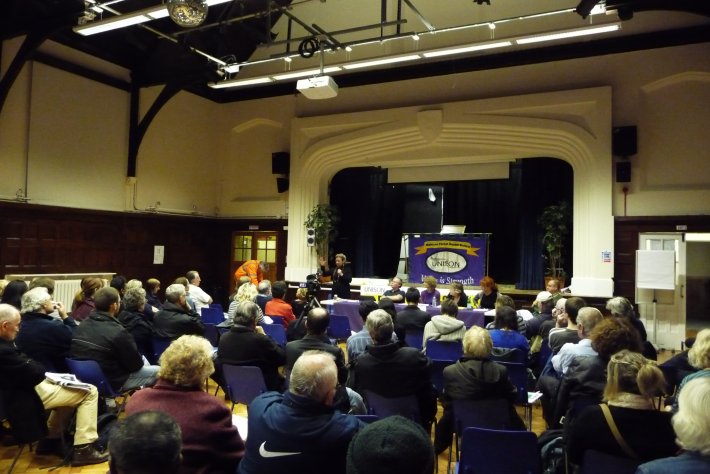
(Branch Chair, Steward, and Health and Safety rep for UCLH), Jill
Mountford (from the Save Lewisham Hospital Campaign), Chris Moore (Stroud
Against the Cuts co-ordinator), Adrian O’Malley (Unison Branch Secretary
for Mid-Yorkshire NHS Trust) and Mary Burnett (We Are Waltham Forest health
campaigner).
Whipps Cross union
representative Charlotte Monro, who chaired the meeting, has been suspended by
the Barts Trust management from Trust consultation forums over trade union
activities in support of staff and local health services. She said that this
meeting was happening only days before a decision will be made as to whether
cuts to large numbers of jobs and posts at Whipps Cross will go ahead. There
has been a massive response from workers and people in the community to these
proposals, and there is great concern that a wealth of experience and knowledge
will be lost if these job cuts are allowed to happen. She said, “We as
staff will fight the attacks on our rights and on
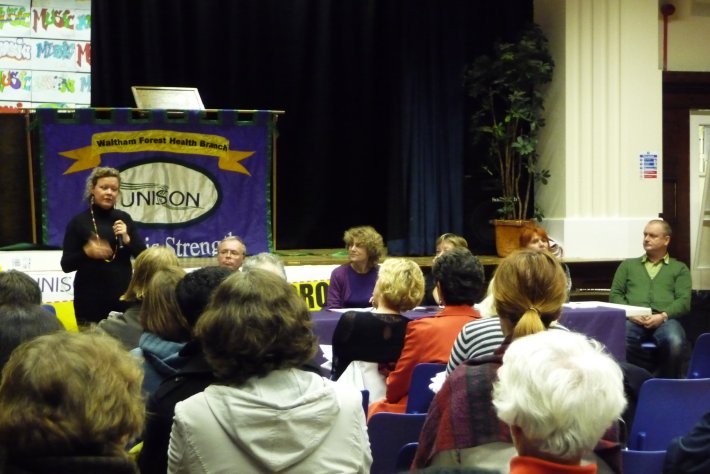
Janet Maiden speaking our dignity
as health workers. But we also want to save our hospital so that it is there
for everyone.” Commenting on the cuts to services, Ms Monro said that
“the government is directly undermining services by undermining
staff’, and she emphasised the need to fight for the right for staff to
speak out about any problems they encounter and not allow these issues to be
swept under the carpet.
Following this introduction, the six speakers all spoke passionately about the need to fight for and defend the NHS! They all spoke about jobs and services at Whipps Cross Hospital, and very many other hospitals and services across the country that are currently being threatened with cuts to jobs and services.
Len Hockey pointed out that the language of the so-called “reforms” being pushed through Parliament, is of the markets. He said that PFI “out-sourcing” is about shifting the wealth away from ordinary people to the privileged one percent, and that PFI is known amongst health workers mockingly as “Profit From Illness”.
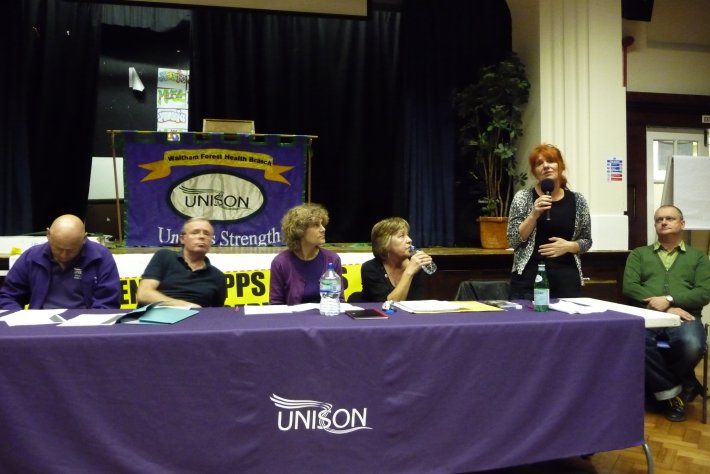
Jill Mountford speakingJanet
Maiden, a nurse for over thirty years, spoke with passion about her experience
working in the health service where cuts to jobs and services are leaving those
that are left struggling to cope.
Jill Mountford spoke eloquently about her own experience of campaigning for Lewisham Hospital. She said, “You have to be audacious. You have to dare to say what you want and dare to fight for it.” She declared, “Our goal is to build a broad fight that is going to unite people and defend our NHS.”
Chris Moore echoed this theme saying, “People should consider standing for election themselves as independent candidates to save the NHS.” He also commented that since the Coalition has come to power, three thousand nurses’ places have gone and some £20 billion in cuts to health spending forced through. He said that it is the private sector that is soaking up the advantages in the form of companies like KPMG and Capita Health, who all advise the government on the so-called “reforms” and yet directly benefit where services are privatised.
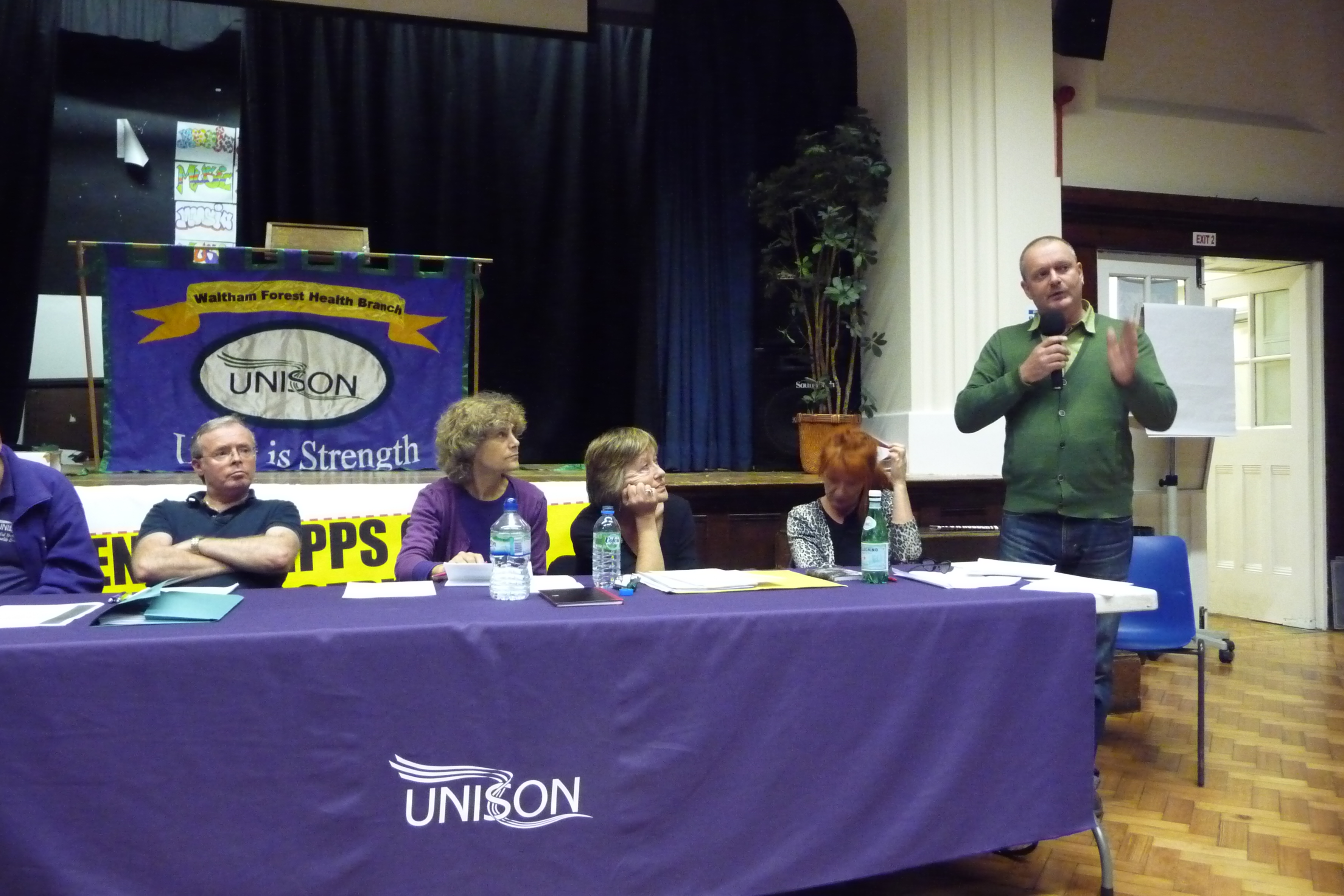
Chris Moore speaking Adrian
O’Malley spoke about the experience of the Mid Yorkshire Hospitals Trust
where the administration and clerical workers at hospitals in Wakefield,
Dewsbury and Pontefract staged nine days of walkouts and strikes over plans to
re-grade jobs. He said, “Our strike showed we could be successful!”
He said that the success of their campaign lay in having widespread discussion,
not just within the hospitals with health workers, but by holding public
meetings where members of the public and health workers could discuss together.
He said that going to public meetings gave the workers a chance to explain to
people why they were taking action, and they received massive public support as
a result. He reiterated the stand, “We’re all in it together!
It’s our NHS. We should defend it!”
Finally, Mary Burnett spoke about the on-going case being brought by Barts Health Trust, which is carrying out disciplinary action against Charlotte Monro, a long-standing trade union activist at Whipps Cross Hospital, and as part of this action, has barred her from representing members at the Trust-wide staff consultative forum pending an investigation in connection with her trade union activity. The whole meetings clapped as she declared that workers must have the right to speak out without fear for their jobs, and she wished Charlotte a successful outcome for her case.

Adrian O'Malley speaking There was
extensive discussion following the presentations of the main speakers,
elaborating on the various points raised and crucially, speaking about their
own experience. The meeting concluded with a message from the Chair saying,
“We must demand that we have properly functioning hospitals with staff
and skills to run them!”
This meeting underlined the importance of people getting together and discussing, and points the way forward to solving the current crisis. At stake is the future of the National Health Service and the right to health care. This future cannot be left in the hands of the financial institutions, or multi-national companies, or in the hands of governments who serve their interests. It is vitally important that everyone, health workers, anyone involved in the provision of health care, and ordinary people alike, get together to discuss what is happening to their NHS and to work together to defend jobs and services. The starting point is meetings such as this one where people can share their experience, become informed about what is going on, and participate in the struggle to safeguard the future of the NHS.
ShareThis
The “Fundamental Review of Funding Allocations” to NHS CCGs:
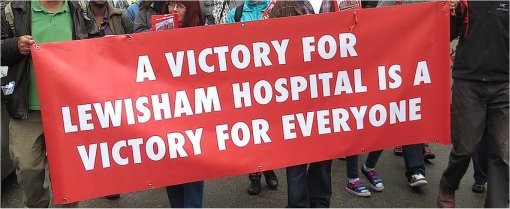
The discussion on how the NHS commissioning
groups in all regions of England should be funded by NHS England next year has
been going on behind closed doors for several months. The only official
indications have emerged from several questions in the House of Commons and in
the Lords. In these question MPs have raised concerns about the
“anomalies” in funding for their constituencies.
On June 11, Hugh Bayley (York Central) (Lab) asked: “What plans the Government have to change the NHS formula for funding clinical commissioning groups; and if he will make a statement.” The reply he received from Jeremy Hunt, Secretary of State for Health, was: “Allocations to CCGs are the responsibility of NHS England. However, I have been advised that NHS England will rely on advice from the Advisory Committee on Resource Allocation (ACRA) for changes in the CCG formula.” What was extraordinary in this short exchange was that firstly he confirmed that under the Health and Social Care Act 2012 the government no longer considered itself responsible for NHS England as if it were some kind of private company and not the National Health Service. Then in the exchange, he revealed the consequences as NHS England was likely to follow precisely the ACRA recommendations, when he said that “it would lead to higher growth for areas with better health outcomes and lower growth, or even cuts, for areas with less good outcomes, which it thought would be inconsistent”. This admission by the government Minister responsible for the NHS is because the ACRA recommendations place more weight for the funding of the health budget for Clinical Commissioning Groups on the age of the population and “good outcomes” and give less weight of allocation of funding to areas with poor health outcomes.
Then on August 13 and 14, NHS England issued its “Gateway” and “Terms of Reference” of its “Fundamental Review of Allocations Policy” based on the ACRA recommendations. This prompted a comment on August 16 in an article by the Health Service Journal (HSJ), “Redistributing CCG funding could mean real terms cuts, NHS England warns”. It pointed out: “Guidance sent to commissioners yesterday restated NHS England’s explanation of why it decided not to use the formula this year. It says: ‘NHS England were concerned that while the formula accurately predicts need as currently met, it did not capture unmet need, and that the formula on its own would have resulted in higher allocations to areas with better health outcomes.’” NHS England had opted instead to give commissioning groups flat rate increases while it undertook a “fundamental review” of resource allocations for 2014-2015. The “Gateway” letter revealed that NHS England would be running “workshops” in Leeds, Birmingham, Newbury and London throughout September. But it is quite clear that neither Parliament, health workers, nor anyone have any say in such a fundamental question of the funding of the NHS.
Already, the change from funding of health care on the basis of the population, the needs of that population, the necessity to provide it in areas where the demand for investment is higher, has been changed for general health care to the economical anarchy of “payment by results”. This means hospitals and community services go further into debt unable to plan their care. Some specialist services are still funded on the basis of population. But the issue now is how the Clinical Commissioning Groups are going to be funded, adding another obstacle to delivering sustainable health care to the population.
The argument being put forward by ACRA is that where there is a higher proportion of elderly people in any part of the country, those areas will require more health resources. This is a mechanical equation of longer life with the need for greater health resources. Should not the argument be rather that where the population is not living so long because of ill health and poor conditions, there is a greater need for investment in resources to provide for the amelioration of poor health? But instead those suffering ill health and worse life outcomes are blamed for their plight and denied resources. It is fraudulent and irrational to claim that health funds should be reduced in the poorer areas where life outcomes are worse. What is required is an immediate increase in the investment in the NHS to all areas of the country to stave off huge financial crisis in the National Health Service under the fraudulent excuse of “austerity”.
The government's refusal to fund the NHS is wrecking the health service both in terms of funding and in terms of the increased costs of the private sector providers that are now creaming off profits from the NHS. Among the hundreds of examples of how the funding of the NHS has been compromised even within the set budgets is that last year it was revealed that NHS England handed back £3 billion to the Treasury over two years. However, the real question is how the NHS funding should be decided and how the need is for a change from the anti-social direction in which the government has taken the NHS on behalf of the monopolies.
The government has the responsibility on behalf of society to ensure that the NHS is funded to meet the needs for universal health care and that it is fully resourced both in terms of material and human resources. No decision should be taken on the funding of the NHS without this fundamental human right to health care being guaranteed by government.
Such a direction recognises on this basis the need firstly to end the year on year 4% cuts to health budgets of hospital and community services, for a moratorium on the PFI payment to the finance capitalists and for more to be put into the health service than is taken out to defend and safeguard its services. Furthermore, a change of direction means the ending of the sell-off of health care to the private sector and the taking back of privatised parts of the NHS back into public ownership. A public enquiry into the profits that the private sector has made from its involvement in the health service would not be out of place, with the aim of the restitution of the siphoned-off funds to the public treasury.
Health workers and the working class and people everywhere are fighting in Lewisham, Staffordshire, Barts and many other areas to defend their health services. The demand to change this direction on the funding of the NHS is central to that struggle to safeguard its future.
Further references:
http://www.publications.parliament.uk/pa/cm201314/cmhansrd/cm130611/debtext/130611-0001.htm
Fundamental Review of Allocations Policy and other material
Gateway
http://www.england.nhs.uk/wp-content/uploads/2013/08/lett-commiss.pdf
Terms of reference
http://www.england.nhs.uk/wp-content/uploads/2013/08/ann-d-tor.pdf
http://www.hsj.co.uk/news/finance/exclusive-nearly-3bn-returned-to-treasury/5051242.article
ShareThis

London 11 "Friends of
Syria"Last week the government hosted a meeting of
the so-called “London 11”, the foreign minsters of the core group
of the self-styled Friends of Syria, which comprises those countries that are
the most active supporters of the armed opposition to the government of Syria.
The group includes the governments of Britain, the US, France, Italy, Turkey,
Saudi Arabia, Qatar, Egypt, Germany, the United Arab Emirates and Jordan.
Representatives of the Syrian National Coalition, one the main opposition
groups, supported by the British government and its allies, also attended the
meeting.
The meeting was convened in order to prepare for the much-heralded conference scheduled to take place next month in Geneva (known as Geneva II), which was originally proposed by the UN Action Group on Syria in 2012, a more broadly based international grouping which also included Russia and China. More recently the desirability of Geneva II has been reaffirmed following the summit meeting of the US and Russia. It has long been planned that in Geneva representatives of the Syrian government and the opposition groups would meet together in order to discuss how the current bloody conflict might be brought to a peaceful conclusion.
The Geneva Communiqué agreed by the UN Action Group originally specified the need for a sustained and lasting ceasefire, agreed principles for a Syrian-led and fully inclusive political transition, including national dialogue and a transitional governing body, and committed itself to the “sovereignty, independence, national unity and territorial integrity of Syria”. In the interim the government of Syria has consistently expressed its readiness to participate in such a conference, while the Syrian National Coalition, which the British government refers to as “the sole legitimate representative of the Syrian people”, has refused to take part unless President al-Assad makes a commitment not to play any role in the transitional process.
The policy of the British government has been to do everything to support the armed opposition to the Syrian government, itself an open breach of international law and the UN Charter, while claiming that it supports Geneva II, as long as al-Assad and other members of his government do not take part. At the London meeting last week, it did nothing to depart from its preferred strategy, which is based on a demand for regime change in Syria and for which the people of Syria are paying such a heavy price. The British government and its allies blame the Syrian government for all the violence in Syria while openly supporting and arming those attempting to destabilise and overthrow it. It is clear that should Geneva II ever take place the “London 11” wishes to use it as the basis for even further intervention in Syria.
The Russian government immediately condemned the meddling of the British government and its allies. It accused the “London 11” of attempting to re-write the Geneva Communiqué in order to create “regime change” in Damascus, criticised the attempts of Britain and others to present the Syrian National Coalition as the sole representative of the opposition in Syria and added that the communiqué issued in London this week contained a “poorly hidden threat” of armed intervention in Syria. For its part, the government of Syria said that it would attend Geneva II and attempt to make it a success “without any preconditions or foreign intervention”. A foreign ministry spokesman added that the “Syrian people will not allow any foreign party to impose itself ... in choosing a government, or in determining its powers and tasks”.
The government of Britain must be condemned for its continued meddling in the internal affairs of Syria and for inciting and fuelling a conflict aimed at regime change that has led to thousands of deaths and millions of refugees and displaced persons. It must also be condemned for its hypocrisy and alleged humanitarian concern for the people of Syria. The people of Syria must be allowed to decide their own future free from all external interference and the task of the workers and all democratic people Britain is to create the conditions to prevent further interference by a British government in Syria or elsewhere by establishing an anti-war government.
ShareThis